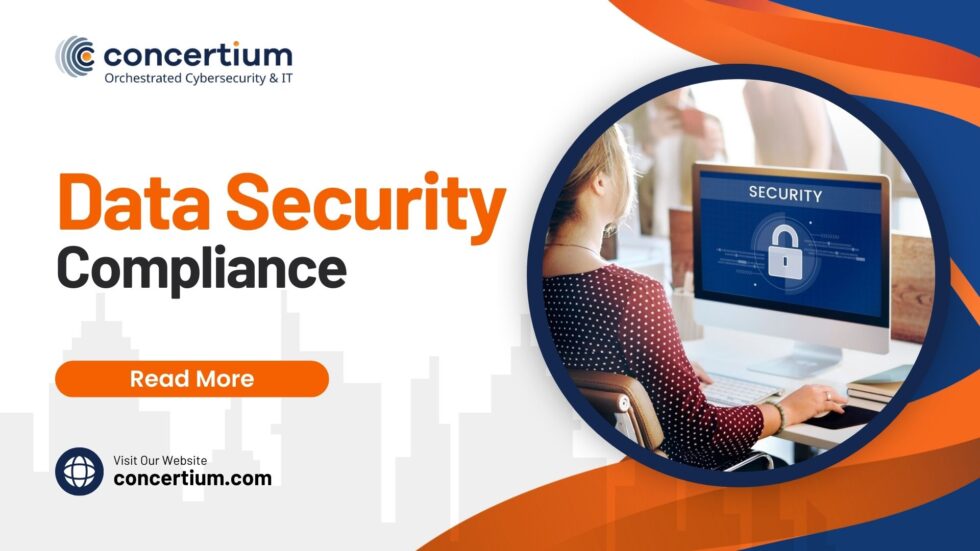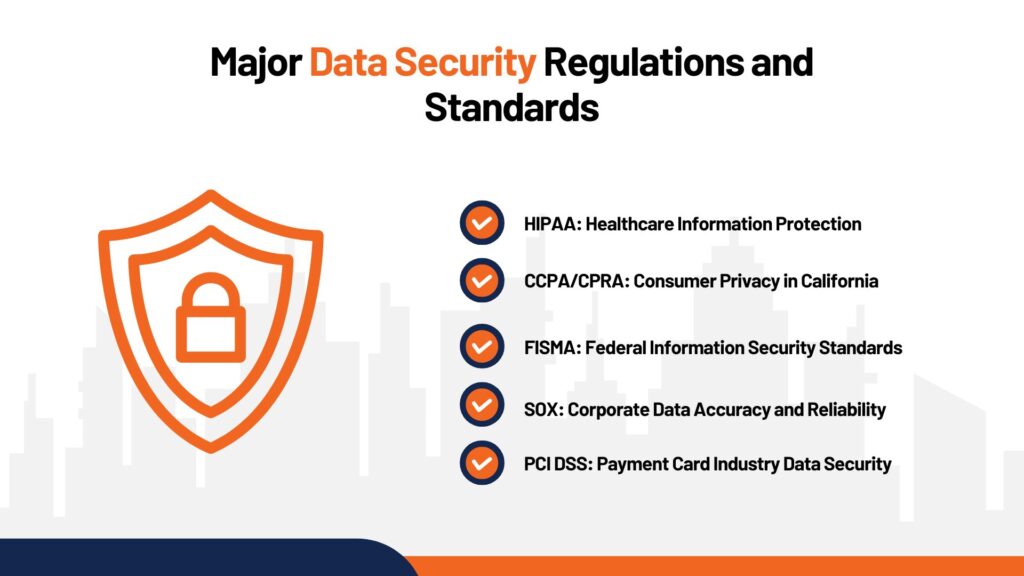Data security compliance has emerged as a pivotal cornerstone for organizations across the globe. This concept encapsulates the adherence to legal, regulatory, and technical standards designed to protect sensitive information from unauthorized access, use, or data breaches.
Data security compliance serves not only as a shield for personal data but also as safeguarding the integrity and confidentiality of an organization’s information assets. Therefore, understanding and implementing robust data security measures is indispensable.
In this blog post you’ll learn about data security compliance, challenges and its impact on businesses.
What is Data Security Compliance
At its core, data security compliance refers to policies, procedures, and security standards that ensure data protection. This encompasses a broad spectrum of sensitive data types, including but not limited to Personally Identifiable Information (PII), financial information, and Protected Health Information (PHI) as outlined by CompTIA. For instance, PII can range from basic contact information to more sensitive details such as social security numbers and medical records.
Safeguarding this data not only protects individuals’ privacy but also shields organizations from potential threats and vulnerabilities. In other words, compliance is not merely a legal obligation but a critical component of an effective information security management strategy.
In addition, compliance with standards such as the General Data Protection Regulation (GDPR), the Payment Card Industry Data Security Standard (PCI DSS), and the Health Insurance Portability and Accountability Act (HIPAA) serves as a testament to an organization’s commitment to security and privacy. These compliance standards are essential in preventing data breaches, ensuring data privacy, and fostering trust among consumers and partners alike.
Above all, navigating the complex terrain of data security compliance requires a comprehensive understanding of the applicable regulations and the implementation of rigorous security measures. After that, organizations must also continuously monitor and update their compliance practices to align with emerging security standards and technologies.
Major Data Security Regulations and Standards
Data security compliance requires a deep understanding of various regulations and standards. These frameworks are pivotal in ensuring the protection of sensitive data across different sectors. Let’s delve into some of the most critical ones.
HIPAA: Healthcare Information Protection
The Health Insurance Portability and Accountability Act (HIPAA) is a important in the healthcare industry. It mandates the safeguarding of health information to protect patient privacy. Healthcare providers, insurers, and their business associates must ensure that personal health data is kept confidential and secure, both in digital and non-digital forms.
This includes implementing security controls to guard against unauthorized access and ensuring data integrity. The significance of HIPAA lies in its comprehensive approach to data protection compliance, covering aspects from data storage to data transfer.
CCPA/CPRA: Consumer Privacy in California
California has set a benchmark for data privacy with the California Consumer Privacy Act (CCPA) and the California Privacy Rights Act (CPRA). These laws give residents more control over their personal information. Businesses that collect, store, or utilize California residents’ data must comply with these regulations.
They emphasize the right to know what data is collected, the purpose of its use, and the right to have it deleted. These acts underscore the importance of transparency and customer data protection, influencing data governance models beyond California’s borders.
FISMA: Federal Information Security Standards
The Federal Information Security Management Act (FISMA) applies to federal agencies and entities dealing with government data. It requires the implementation of information security management systems to protect data integrity, confidentiality, and availability.
FISMA’s framework includes risk assessments, security policies, and compliance audits to ensure robust data security and compliance within government operations. By setting a high standard for data management, FISMA plays a crucial role in national security and governance.
SOX: Corporate Data Accuracy and Reliability
The Sarbanes-Oxley Act (SOX) focuses on corporate governance and financial practices, particularly for publicly traded companies. It mandates strict record-keeping and data management practices to prevent fraud and ensure financial data’s accuracy. SOX has significantly influenced how companies approach data protection compliance and information security, emphasizing the need for transparent and reliable financial reporting.
PCI DSS: Payment Card Industry Data Security
The Payment Card Industry Data Security Standard (PCI DSS) is vital for any business that processes, stores, or transmits cardholder data. Developed by the Payment Card Industry Security Standards Council, this set of security standards is designed to protect payment card information from data breaches and fraud. Compliance with PCI DSS is not optional; it’s a necessity for safeguarding customer data and maintaining trust in the financial transactions ecosystem.
Implementing a Compliance Program
Steps to Start a Cybersecurity Compliance Program
Launching a cybersecurity compliance program is crucial for any organization that aims to protect its data effectively.
- According to CompTIA, the first step involves understanding the specific data security and compliance requirements that apply to your industry. This includes familiarizing oneself with relevant standards and regulations.
- After that, conducting a risk assessment to identify vulnerabilities in your current system is key.
- The next phase involves developing a comprehensive compliance framework that addresses these risks and aligns with industry standards. Essential to this process is the creation of policies that govern how data is handled, protected, and accessed.
Data Classification, Encryption, and User Access Control
Forcepoint emphasizes the importance of data classification in a robust data security compliance program. This process involves categorizing data based on sensitivity and the level of protection it requires. Sensitive data, such as personal information and cardholder data, should be encrypted to prevent unauthorized access.
Additionally, implementing strict user access control measures ensures that only authorized personnel can access certain data, minimizing the risk of data breaches.
Continuous Review and Adjustment of Data Protection Measures
Its necessity for continuous review and adjustment of data protection measures. The data security landscape is ever-changing, with new threats emerging regularly. Therefore, organizations must regularly review their security measures and compliance policies to ensure they remain effective. This includes updating security controls, conducting regular compliance audits, and training staff to recognize and respond to security threats appropriately.
Challenges in Data Security Compliance
Keeping Up with Evolving Standards and Technologies
One of the significant challenges in data security compliance is staying abreast of evolving standards and technologies. Regulations and security requirements are constantly changing, requiring organizations to be vigilant and adaptable. This necessitates a commitment to ongoing education and investment in the latest security technologies to protect customer data effectively and comply with data protection compliance standards.
Balancing Compliance with Operational Efficiency
Experts points out the challenge of balancing compliance with operational efficiency. Implementing comprehensive security and data compliance measures can be resource-intensive and may impact day-to-day operations. Organizations must find a way to integrate compliance requirements seamlessly into their operations without hindering efficiency. This involves leveraging technology to automate compliance processes and designing security controls that support business processes rather than obstruct them.
Implementing a data security compliance program and overcoming its challenges requires a strategic approach that incorporates understanding regulations, classifying data appropriately, and continuously adapting to new threats. Balancing the demands of compliance with operational efficiency remains a complex but essential task for organizations aiming to protect sensitive data and maintain trust with their stakeholders.
How Data Compliance Impacts Businesses
Data compliance transcends mere security measures, embedding deeply into how businesses handle, transmit, and leverage data within their operations. It sits at the crossroads of safeguarding consumer/patient/client data privacy and the legitimate use of such information by businesses. Understanding your organization’s obligations under data compliance involves several critical considerations:
- Protection Against Unauthorized Use: Ensuring data is shielded from unauthorized use or disclosure.
- Protection Measures: Identifying whether data should be secured through technical, administrative, or physical safeguards.
- Usage of Data: Determining how data is utilized, whether for business operations or customer/client/patient services.
Data compliance is pivotal for businesses due to several reasons:
- Upholding Individual Rights: Aligns the management of business information with the rights of individuals to control and access their information, with specific regulations varying across industries.
- Ethics and Data Privacy: Acts as a cornerstone of ethical standards, particularly in sectors like healthcare, retail, and finance, where user privacy is deemed fundamental.
- Business Uses of Data: Governs the appropriate business use of data, including restrictions and guidelines on data utilization, retention, and conditions under which it can be used.
- Consent Management: Emphasizes the necessity for clear consent mechanisms, where certain frameworks mandate businesses to secure documented consent for data use in marketing or other purposes.
This multifaceted approach to data compliance not only ensures security but also enforces ethical use, respects individual rights, and mandates clear consent processes, fundamentally shaping how businesses operate and engage with data in the digital age.
Best Practices for Data Security Compliance
To achieve robust data security compliance, adopting best practices is crucial. This includes ongoing employee education and attaining relevant certifications.
Regular Employee Training and Awareness Programs
First and foremost, regular training and awareness programs are vital. Training can equip employees with the knowledge to handle sensitive data securely and understand the potential risks of data breaches. Training programs should not only cover the basics of data security but also keep staff updated on the latest threats and compliance requirements. This ensures that everyone in the organization plays an active role in safeguarding customer data.
Compliance Audits and Certifications
Furthermore, obtaining audits and certifications like ISO 27001, PCI DSS, and GDPR Compliance is essential. These certifications demonstrate an organization’s commitment to data protection compliance. They also provide a framework for managing data security and ensure that companies meet international security and privacy policies. Engaging in regular compliance audits helps identify gaps in data management and security controls, enabling timely adjustments to maintain high security standards.
What People Also Ask
What is Data Security Compliance?
Data security compliance refers to adhering to laws, regulations, and standards designed to protect personal information and sensitive data from unauthorized access and misuse. It's about ensuring that data is used, stored, and managed in a way that meets security requirements and protects the privacy of individuals.
Why is Compliance Important?
Compliance is critical because it helps prevent data misuse and breaches, which can lead to significant financial and reputational damage. It also ensures that an organization respects and protects the personal data of its customers and employees, thereby fostering trust.
How Can Organizations Ensure Compliance?
Organizations can ensure compliance by implementing a robust data security and compliance program that includes data classification, encryption, and user access control. Regular employee training, compliance audits, and obtaining relevant certifications are also key strategies for maintaining data security compliance.
Conclusion
Implementing a robust data security compliance program, staying abreast of evolving standards and technologies, and balancing operational efficiency are critical steps toward safeguarding sensitive data. By investing in regular employee training, achieving compliance certifications, and continuously reviewing security measures, companies can build a strong foundation for data protection.
This approach not only ensures compliance with current regulations but also prepares organizations for future challenges in the digital landscape. Above all, a commitment to data security compliance demonstrates an organization’s dedication to protecting its customers’ data, thereby fostering trust and ensuring long-term success in the ever-evolving world of data security and privacy.






